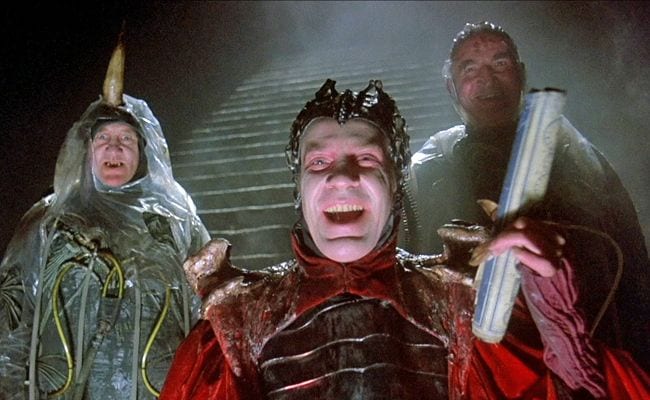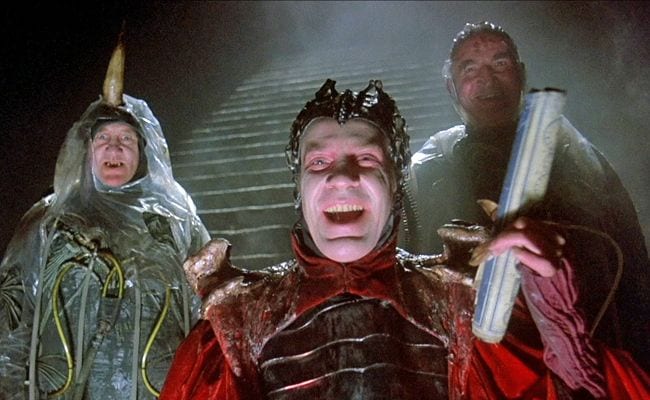
Is it possible that Time Bandits, often hailed as a testament to the joys of childhood imagination, might be Terry Gilliam’s most pessimistic film? Let’s throw spoiler caution to the wind — the film is 34 years old, after all — and examine the facts: Kevin (Craig Warnock) is a boy who uses books and his imagination to escape the drudgery of his day-to-day life. His bedroom walls are covered with drawings of knights and fantastical figures, his toys ranging from Legos to cowboys to robots. One night, an actual knight astride a warhorse tramples through his bedroom and off into a forest where Kevin’s wall used to be. This startling scene is followed by a group of diminutive time-travelers who have stolen a map of time and space from the Supreme Being. They’re using the map to plunder history of its treasures, and Kevin gets pulled into their adventures.
From there, it’s pretty much a bucket list of places an inquisitive child would want to go: ancient Greece, Napoleonic Europe, Sherwood Forest, the Titanic, and a realm of monsters and folklore known as the Time of Legends. Time Bandits blends history and fantasy, treating them as equals, often blurring the lines between the two. King Agamemnon (Sean Connery) slays a minotaur, an ogre and his wife travel the seas, and a giant takes the band of thieves on a dangerous ride.
On the one hand, it’s one adventurous set piece after another, punctuated by squabbling amongst the thieves and by the machinations of Evil (David Warner) to get the map. Evil holds a dim view of the Supreme Being’s creation, seeing it as a cosmos full of useless creatures such as slugs. Evil, dressed in bony armor that glistens like its just been removed from its previous owner and with what looks to be a face-hugger from Alien clamped to his skull, has a much more efficient and technological plan for creation.
To some degree, you could argue that Gilliam might share some of Evil’s views, at least towards the people who populate the world. Anyone who saw Jabberwocky or Monty Python and the Holy Grail will be glad to see that Medieval times are still full of blood, shit, and violence. Gilliam’s desire to tweak power structures and bureaucracies leaves hardly anyone unscathed. Napoleon (Ian Holm) is obsessed with height to the point of ignoring his duties as conqueror. John Cleese’s Robin Hood is a two-faced gladhander (who admittedly does still help the poor). The Supreme Being (Ralph Richardson) may be on top of things, but Gilliam leaves the door open as to whether God is, at best, unthinking, and at worst, cruel, towards humanity. Connery’s Agamemnon fares as well as anyone, and even he is left cheated after a magnanimous gesture towards Kevin.
As for Kevin, he suffers most of anyone. He thinks he’s found a home in Greece (where, let’s face it, he probably would have been assassinated by Agamemnon’s jealous queen), only to have the thieves steal him away and put him back into danger. After Evil is finally defeated, Kevin’s fate is treated as an afterthought by the Supreme Being, and that resolution only serves to leave Kevin an orphan, standing amidst the ruins of his formerly dull life. If you want to be optimistic, you could view the film’s final scene as a new beginning for Kevin: he’s seen the wonders of creation, he’s gone on an incredible journey, and this is the first step on even more adventure. Perhaps he’s, as the Supreme Being put it, ready to “carry on the fight”. This is a Terry Gilliam film, though, so probably not. By contrast, Brazil‘s Sam Lowry should consider himself lucky.
Pessimism, by Gilliam’s own account, certainly wasn’t his intention. He and fellow scriptwriter Michael Palin set out to make a film that was “exciting enough for adults and intelligent enough for children”, and Kevin’s adventures would certainly fuel the imagination of nearly any child watching the film. For an adult viewer, though, there’s the nagging sense that all this adventure is good for is to steal all of life’s joy from Kevin.
Kevin’s final fate in the film was the cause of some controversy, which Gilliam brushed off by essentially saying kids are smart enough and tough enough to handle it. So in that respect, one could argue that it’s like an original fairy tale, where bad things happen left and right in gruesome detail, all for instructive purposes. If so, though, where’s the transgression on Kevin’s part? Going along with Randall (David Rappaport) and his crew? He’s essentially scared into that by the appearance of the Supreme Being, and throughout the film Kevin’s wits are the only things that save the group.
Watching Time Bandits as an adult isn’t a letdown by any means; it still overflows with imagination, seat-of-the-pants set design, humor, and a true sense of adventure. However, it’s not the wonder-filled experience it used to be. It would be accurate to point to this as one of Gilliam’s strengths as a filmmaker: he isn’t afraid to give his films a hard edge, even if they’re ostensibly for kids. Plus, it’s hard to find fault in a film that changes its offerings as the viewer gets older. It’s still a must-see for Gilliam fans.
It doesn’t hurt, either, that this Blu-ray release is exactly what you’d expect from a Criterion Collection release. The picture is excellent, and the bonus materials are extensive: these include commentary by Gilliam, Palin, Cleese, Warner, and Warnock; interviews with the film’s production designer and costume designer; and a 1981 Tom Snyder interview with Shelley Duvall . David Sterritt’s essay “Guerilla Fantasy”, printed on the back of a replica of the film’s map), addresses the film’s darker themes, and the 80-minute interview between Gilliam and Peter von Bagh at the 1998 Midnight Sun Film Festival is informative in terms of Gilliam’s formative years, his tenure in Monty Python, and the challenges he’s faced in his work.


![Call for Papers: All Things Reconsidered [MUSIC] May-August 2024](https://www.popmatters.com/wp-content/uploads/2024/04/all-things-reconsidered-call-music-may-2024-720x380.jpg)



